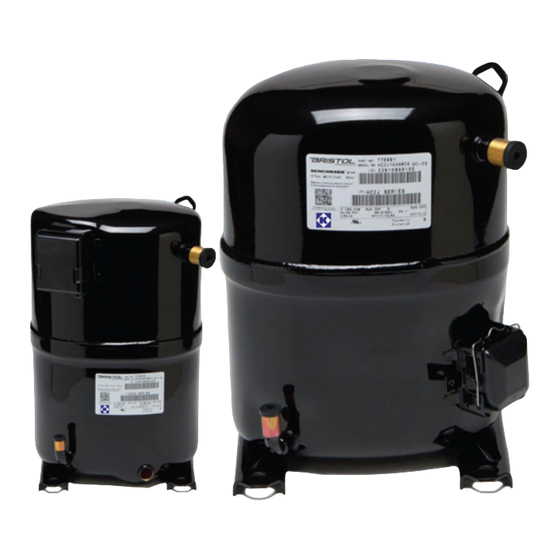Bristol A Series Handbuch für Installation und Service - Seite 8
Blättern Sie online oder laden Sie pdf Handbuch für Installation und Service für Luftkompressor Bristol A Series herunter. Bristol A Series 18 Seiten. Refrigeration/air conditioning/heat pump compressors

B.
Liquid Line Filter: Always replace the original equipment liquid line filter drier(s). If the OEM liquid
line drier(s) is not removed from the system, a restriction most likely will result. A slight restriction in
this filter will reduce the efficiency of the system. A large restriction will cause the suction pressure
and discharge pressure to be reduced. This reduction in pressure will occur only with a properly
charged system (i.e., refrigerant weighed in to the OEM specifications). An over-charged system will
increase pressures when there is a restriction in the liquid line. The service person tends to add
more charge to the system to increase the suction pressure. Normally, any charge added above the
OEM specifications will increase the suction pressure due to the discharge pressure increasing but in
the case of a restriction, charge can be added to a point the system shuts down on the high pressure
limit switch. The service person may not see the higher discharge pressure due to his service port
being in the liquid line which is normally downstream from the liquid line filter drier in residential split
systems. A pressure port installed in the hot gas discharge line just as it exits the compressor is
required to see true discharge pressure.
C.
Discharge Line Filter: Some OEM equipment may have a filter in the hot gas line (6" – 12" from
compressor). Checks outlined in (B) above apply.
IMPORTANT: The compressor has an internal relief valve (IPRV) that is designed to open if the
system is subjected to a high pressure situation. Example causes are: overcharged, air in system,
restriction, factory-installed metering device screens not removed and cleaned, old liquid line filter left
in the system, poor airflow across the condenser, condenser fan failure, poor airflow across the
evaporator in the heating mode (dirty return air filter(s)), poor system design (duct system
undersized), etc. The IPRV will open when the discharge pressure exceeds the suction pressure by
more than 450 psi ("B" products) or 400 psi ("A" products). If the relief valve opens, a high velocity
gas flow may be heard inside the compressor housing. In some cases, the relief valve may open so
quickly due to a restriction in the system, the high pressure will be difficult to observe on standard
gauges. In most instances, if the service person installs a discharge service gauge on the discharge
line just as it exits the compressor, the development of high pressure can be observed before the
relief valve opens. Installing the discharge service gauge on the liquid line outside the system may
not detect a restriction. To reset the relief valve, shut the compressor off for at least 5 minutes,
allowing pressures to equalize.
R
REVIEW ALL TWELVE STEPS TO MAKE SURE NOTHING WAS OVERLOOKED.
Page 8
